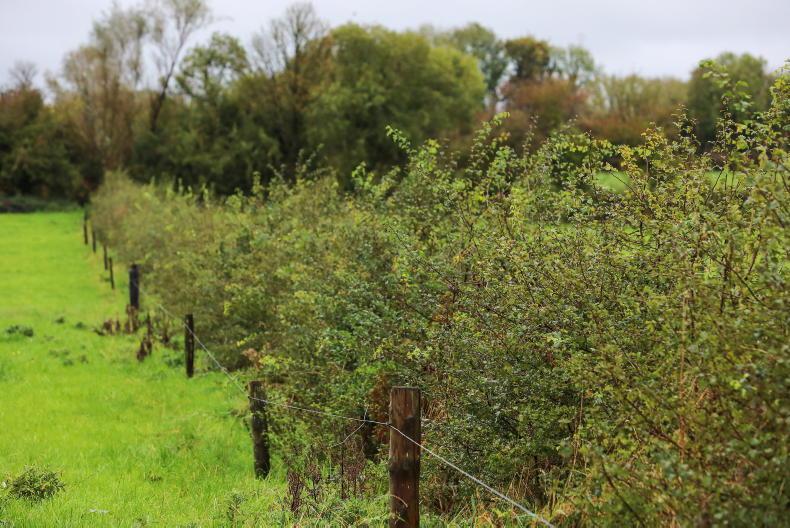Two NGOs have raised “serious concerns” with the import of whitethorn plants for planting hedgerows under the Agri-Climate Rural Environment Scheme (ACRES).
Fears raised by Hedgerows Ireland and Woodlands of Ireland concern the import of the bacteria which cause fireblight in whitethorn, apple, pear and other tree species - Erwinia amylovora - which is difficult to treat.
The Department of Agriculture granted ACRES farmers the flexibility to use non-native whitethorn plants at the end of November, amid low supplies of native plants created by the surge in demand under the agri-environmental scheme.
Under ACRES, all other species of hedgerows require the use of Irish-origin plants exclusively.
The groups estimate that the 30,000 farmers participating in the general ACRES entry route will plant up to 2,000km of hedgerows by 31 March 2024 in addition to the hedging planted by the 18,000 co-operation farmers over the coming years.
Both have called for a ban on the import of whitethorn plants pending the completion of a disease risk analysis by the Department.
They are also seeking an extension of the March planting deadline for farmers, pending the outcome of a comprehensive disease risk analysis.
No room for complacency
Spokesperson for Hedgerows Ireland Alan Moore warned that the Department cannot be complacent when it comes to disease risks posed by importing plants and has asked to be supplied with any disease risk analysis which has been carried on the decision.
He cited ash dieback as an example of the destruction that can be caused by the import of plant diseases.
CEO of Woodlands of Ireland Joe Gowran stated that Ireland could lose its status as an EU protected zone for the disease if cases were to be imported.
The entire country, apart from Galway city, is currently recognised a protected zone, but around 19 cases have been detected this year, according to a joint statement released by the groups.
Read more
Requirement for native whitethorn to be used in ACRES dropped
Two NGOs have raised “serious concerns” with the import of whitethorn plants for planting hedgerows under the Agri-Climate Rural Environment Scheme (ACRES).
Fears raised by Hedgerows Ireland and Woodlands of Ireland concern the import of the bacteria which cause fireblight in whitethorn, apple, pear and other tree species - Erwinia amylovora - which is difficult to treat.
The Department of Agriculture granted ACRES farmers the flexibility to use non-native whitethorn plants at the end of November, amid low supplies of native plants created by the surge in demand under the agri-environmental scheme.
Under ACRES, all other species of hedgerows require the use of Irish-origin plants exclusively.
The groups estimate that the 30,000 farmers participating in the general ACRES entry route will plant up to 2,000km of hedgerows by 31 March 2024 in addition to the hedging planted by the 18,000 co-operation farmers over the coming years.
Both have called for a ban on the import of whitethorn plants pending the completion of a disease risk analysis by the Department.
They are also seeking an extension of the March planting deadline for farmers, pending the outcome of a comprehensive disease risk analysis.
No room for complacency
Spokesperson for Hedgerows Ireland Alan Moore warned that the Department cannot be complacent when it comes to disease risks posed by importing plants and has asked to be supplied with any disease risk analysis which has been carried on the decision.
He cited ash dieback as an example of the destruction that can be caused by the import of plant diseases.
CEO of Woodlands of Ireland Joe Gowran stated that Ireland could lose its status as an EU protected zone for the disease if cases were to be imported.
The entire country, apart from Galway city, is currently recognised a protected zone, but around 19 cases have been detected this year, according to a joint statement released by the groups.
Read more
Requirement for native whitethorn to be used in ACRES dropped






 This is a subscriber-only article
This is a subscriber-only article











SHARING OPTIONS: